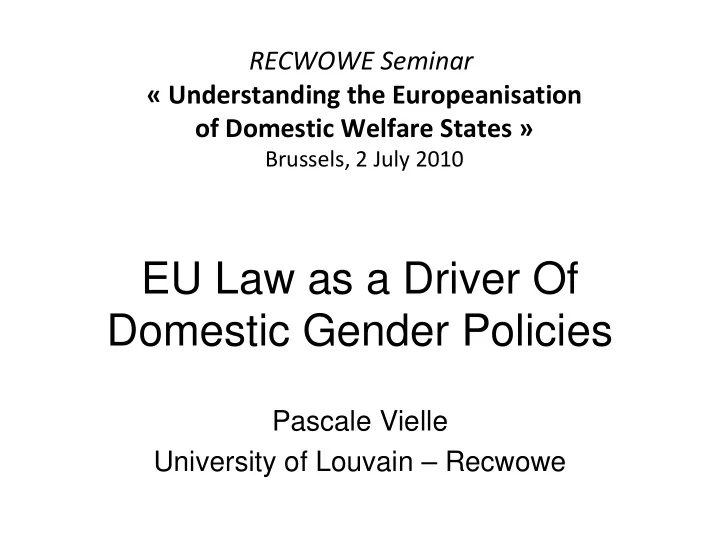

RECWOWE Seminar « Understanding the Europeanisation of Domestic Welfare States » Brussels, 2 July 2010 EU Law as a Driver Of Domestic Gender Policies Pascale Vielle University of Louvain – Recwowe
Introduction • Features of gender policies • The choice of worklife/balance as revelator of the orientation of gender policies
Features of gender policies(1) • Determining influence of the international arena (CEDAW, Beijing) on the EU and the Member States • Cross-loading, networking, epistemic community in gender at all levels BUT • Different pillars : - Elimination of discriminations (HL) - Gender mainstreaming (SL) - Specific actions (structural funds) - Institutional dimensions - Participation of actors ⇒ Organisational fragmentation and corollary risk of dilution of policy objective
Features of gender policies(2) • Fragmentation of principles and meanings (from combating gender based discriminations to diversity, by equal opportunities) ⇒ Risk of confusion from the POV of expected social behaviours ⇒ Risk to mask the conflicts between objectives behind consensual terms • Institutional fragmentation (transversal principle, federalism), But unifying role, in Belgium, of the IEFH
The choice of work-life balance (1) • Essential for substantive gender equality • Articulation with the other case studies of ETOS.be • Integrated policy on all the instruments covered by ETOS.be BUT : • Resistance to intervention in the family sphere • Variance of policies following the policy domains • Ambiguity of objectives (in terms of gender-based roles) • Variance of national policies
I. EU(1) • Recall: - International interferences in the up- and down-loading phases (Beijing) - Instrumental set relatively complete BUT no self-standing OMC on equality (elements in EES and ESF / Roadmap) - Time perspective of the gender approach (formal to substantial)
II.EU(2) Gendermainstreaming and coordination of financial instruments • No specific OMC, but present in EES and OMC on social protection • Specific financial instruments (until Progress), but weak; But present in structural funds (especially ESF) Evolution over the last decade: • General: ESF->EES->growth and employment • Gender: Mainstreaming (formal) // reduction of specific actions ⇒ Impression (of the actors) of a dilution of the objective of gender equality in the EES and ESF ⇒ Cross-loading, networking, epistemic community in gender relatively peripheral to the EES and ESF
II. EU (3) 3 directives - Main Conclusion : • Path dependency of the European gender equality law (since Defrenne) • Limited capacity of the law (of the ECJ) to exit a binary logic inherent to the combat against discrimination and to engage into a reflection on gender equality • In effect, essentialist approach
II. Belgium (1) ( Council Directive 96/34/CE on parental leave) A. Context: – Federalism (multilevel) – Pillars (sub-optimal policy choices) – Corporatism (horizontal division of competences) – Role and institutionalisation of feminist groups (activism and crossloading tradition since Defrenne between UN, the EU Council and the IEFH)
II. Belgium (2) B. Uploading : - Role of the Belgian presidency - Importance of Miet Smet - « Shadow of the law » - Influence of the Belgian model => via the CNT (Jo Walgrave as broker) => No traditional channel in the field of gender
II. Belgium (3) C. Downloading - Legislative adaptation on substance - Transposition competition between Minister and CNT => 2 competing instruments - Current complementarity but initially mutually exclusive until 1998
II. Belgium (4) Conclusion • Vanguard character of certain Belgian initiatives (parental leave, IEFH, …), « caught up » by European law + lateness in transposition => loss in credibility for up-loading! • Difficult to distinguish up/downloading : important crossloading • Crossloading reinforced by the creation of the IEFH (horizontal and vertical coordination) • Importance of individual voluntarism (more than institutions), at least before 2004
III. The Netherlands • Council Directive 97/81/EC on part-time work • Recast Directive A.Uploading : important role of the presidence (Recast Directive) B.Downloading : analogy to the problems encountered in Belgium (Recast Directive) C.Actors: Strategic importance of the equality agency in the downloading; Weak implications of the national trade unions; important role of civil society
Conclusions/ recommendations (1) + Emblematic example of « crossloading », institutionnally sustained (IEFH) + Importance of vertical integration international/European/Federal/Regional, institutionnally sustained (IEFH), and exploited by the actors for up and downloading purposes => Good practices for other countries and policy domains
Conclusions/ recommendations (2) + importance of diversification of actors (institutional, political, civil society, academic), institutionnally sustained, and forming an epistemic community But - Dilution of their domains, especially in specific actions (OMC and ESF) ⇒ Empowerment and implication of actors of gender equality in these domains ⇒ To maintain the domains of specific actions of gender equality in the programmes of actions EES and ESF ⇒ Central role to be given to the Institute amongst the actors of gender equality in all the aspects of functioning of the EES and the ESF
Conclusions/ recommendations (3) + Important role of presidence BUT - Time laps between presidence and loss of influence in between => Must create networking capacities and alliances between countries
Conclusions/ recommandations (4) + Vanguard character of Belgian initiatives BUT - Lateness and incompleteness of transposition might cause a problem of credibility => Necessity to reinforce the process of transposition (for instance in centralising and identifying organs for coordination like in the NL)
Conclusions/ recommandations (5) - Instrumentalisation of the gender equality policies => More actor vigilance and political monitoring practices necessary
Conclusions/ recommandations (6) - Contradiction between the formal and substantive approaches developed between the instruments => Necessity of training of legal actors on the subject of substantive equality; Role of law in the creation of substantive equality
Recommend
More recommend